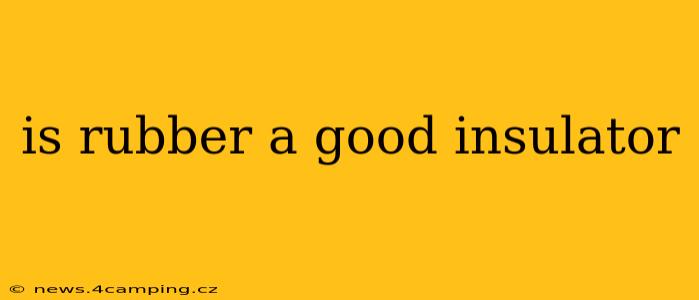Rubber's insulating properties are a complex topic, not a simple yes or no answer. While generally considered a good insulator, its effectiveness depends heavily on several factors. This comprehensive guide will delve into the nuances of rubber's insulating capabilities, exploring its various types, applications, and limitations.
What Makes a Material a Good Insulator?
Before examining rubber, let's understand what constitutes a good insulator. Good insulators impede the flow of electricity, heat, or sound. This ability is determined by a material's inherent resistance to the transfer of energy. Materials with tightly bound electrons resist the flow of electricity; those with low thermal conductivity resist heat transfer; and those with high acoustic impedance resist sound transmission.
Is Rubber a Good Electrical Insulator?
Yes, rubber is generally a good electrical insulator. Its molecular structure, with long chains of carbon and hydrogen atoms, hinders the movement of free electrons. This makes it suitable for applications requiring electrical insulation. However, the quality of insulation varies significantly across different types of rubber.
Types of Rubber and Their Insulating Properties:
-
Natural Rubber (NR): Offers good dielectric strength and resistance to moisture, making it a common choice in electrical applications. However, its performance can degrade with age and exposure to certain chemicals.
-
Styrene-Butadiene Rubber (SBR): A synthetic rubber that offers a balance of properties including good electrical insulation, flexibility, and affordability. It's widely used in various insulation applications.
-
Neoprene (Polychloroprene): Known for its excellent resistance to oils, chemicals, and ozone, neoprene provides good electrical insulation and is suitable for demanding environments.
-
Silicone Rubber: Provides superior heat resistance and excellent electrical insulation, making it suitable for high-temperature applications.
-
Ethylene Propylene Rubber (EPR) and Ethylene Propylene Diene Monomer (EPDM): These offer excellent weather resistance and good electrical insulation, often used in outdoor applications.
Is Rubber a Good Thermal Insulator?
Rubber's thermal insulating properties are less pronounced than its electrical insulating capabilities. While it offers some thermal insulation, it's not as effective as materials like fiberglass or polyurethane foam. Its effectiveness depends on factors like its density and thickness. Thicker rubber provides better thermal insulation than thinner rubber.
Is Rubber a Good Acoustic Insulator?
Rubber's acoustic insulation properties are also moderate. It can absorb some sound energy, but it's not as effective as specialized acoustic insulation materials. Its effectiveness is influenced by factors such as density and the frequency of the sound waves. Thicker, denser rubber tends to offer better sound damping.
What Factors Affect Rubber's Insulating Properties?
Several factors influence the insulating properties of rubber:
- Type of Rubber: As discussed above, different types of rubber possess varying insulating capabilities.
- Temperature: Extreme temperatures can affect the insulating properties of rubber. High temperatures can degrade its performance, while extremely low temperatures can make it brittle.
- Age and Degradation: Over time, rubber can degrade due to oxidation, UV exposure, and chemical attack, compromising its insulating properties.
- Moisture: Moisture can significantly reduce the electrical insulating properties of rubber.
- Thickness: Thicker rubber generally provides better insulation (both electrical and thermal).
- Additives and Fillers: The addition of various fillers and compounds can affect the insulating properties of rubber, sometimes enhancing and sometimes diminishing them.
What are some common applications of rubber as an insulator?
Rubber's insulating properties make it useful in a wide range of applications, including:
- Electrical cables and wiring: Rubber sheathing protects wires and cables from abrasion and provides electrical insulation.
- Gaskets and seals: Rubber gaskets provide electrical insulation while sealing joints and preventing leaks.
- Protective coatings: Rubber coatings protect metal components from corrosion and provide electrical insulation.
- Vibration dampening: Rubber's flexibility makes it effective in absorbing vibrations and isolating sensitive equipment.
How does the quality of rubber affect its insulating properties?
The quality of rubber significantly impacts its insulating capabilities. High-quality rubber, properly processed and free from defects, will exhibit superior insulating properties compared to lower-quality rubber. Impurities, inconsistencies in the manufacturing process, or degradation due to age and exposure can all compromise its insulating effectiveness.
This comprehensive guide should provide a clearer understanding of rubber's insulating properties, addressing the complexities involved and highlighting its various applications. Remember that the effectiveness of rubber as an insulator depends on many factors, and careful consideration should be given to the specific application and type of rubber used.
